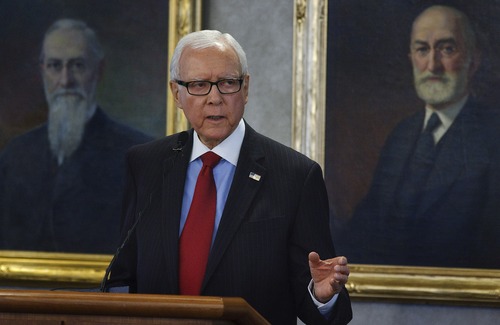This is an archived article that was published on sltrib.com in 2014, and information in the article may be outdated. It is provided only for personal research purposes and may not be reprinted.
Sen. Orrin Hatch called on fellow Republicans Wednesday to show that "we are a party not of shutdowns, but solutions."
He added, "We must not be defined only by what we are against. We must offer an alternative, affirmative agenda that can capture the public's attention," just as Republicans did under President Ronald Reagan.
Hatch said that in a policy speech at Reagan's California ranch, and suggested an agenda of restoring constitutional principles that he said President Barack Obama has ignored, and reforming health care, taxes, federal regulation, education and labor laws.
If Republicans recapture the Senate, Hatch could be in a position to push such an agenda as chairman of the Finance Committee and Senate president pro tempore — and Hatch's speech shows he considers himself a central player in GOP politics after 38 years in the Senate and in the midst of what he has said is his final term.
For example, before the speech, he listed for Utah reporters the Republicans he considers as contenders for the party's presidential nomination — several current and former governors, including Mitt Romney — and said, "I know all of the candidates and potential candidates very well…. I'll be in the middle of it."
Hatch said in his speech that it is "time for Republicans to tell America how we will right this ship, how we will solve the problems Obama has wrought."
In fact, he told reporters before his speech, "I like President Obama, but he's a terrible president."
Hatch said in his speech that Obama and Democrats are departing from constitutional principles, and Republicans should fight to restore them.
"An enormous expansion of the administrative state is now invading core individual liberties. Already the government has assumed authority to force Americans to purchase products they do not want; now it presumes to tell them they must violate deeply held religious beliefs," he said about health-care reforms and gay marriage.
He added, "We must take care always to keep the Constitution as our guide."
The Supreme Court has upheld the constitutionality of the Affordable Care Act and, with its decision not to take up same-sex marriage cases, has allowed lower-court rulings to stand that legalize such unions.
But Hatch insisted the Affordable Care Act is unconstitutional, which "means repealing the program root and brand and replacing it with one that is both more effective and more in line with limited government and a free society."
He said he and other conservatives have introduced a potential replacement that offers "a market-based solution that government monitors, but does not direct."
That plan would allow tax credits for lower-income people to buy insurance but would phase out tax breaks currently enjoyed by people who receive generous health plans through their employer.
Hatch said tax reform also demands attention. "We must stop treating the tax code as an instrument for social engineering," and make it simple to help generate job creation and economic growth.
A third priority, he said, is regulatory reform. To cut down on a growing bureaucracy and costs of compliance, he wants reviews to remove outdated rules and increased judicial oversight "to provide a more robust independent check on new regulation."
He also called for improvements in education and labor laws to help the poor move up the economic ladder.
"For 50 years, we've spent trillions of dollars on massive federal welfare programs that have largely failed. The poverty rate has remained essentially unchanged since 1967," he said. "We need citizens who believe both in the government and in themselves. Simply throwing more money at failed programs does not do this."
He said labor laws should be changed to allow flextime for working parents, help part-time workers and "ensure that the rights of workers — not labor unions — come first."
Hatch called for changing education to do away with top-down, one-size-fits-all directives, and allow more creativity by local schools to meet their needs. He was a supporter of President George W. Bush's No Child Left Behind, which has been criticized for being such a program, changing his mind years after its implementation.
"Government's role is not to provide universal social and economic support, but rather to create opportunities and remove obstacles. A vigorous, dynamic constitutional conservatism will return government to its proper role — that of supporter, not director," Hatch said.



